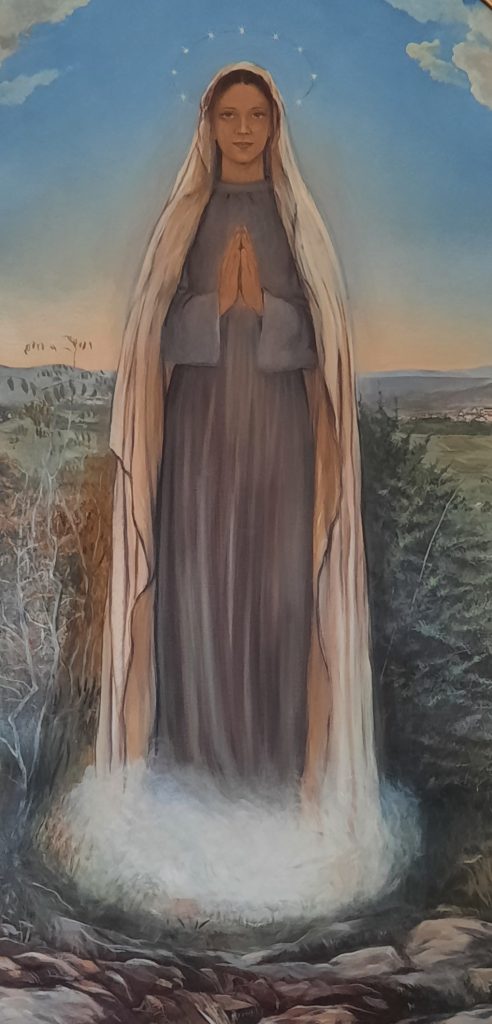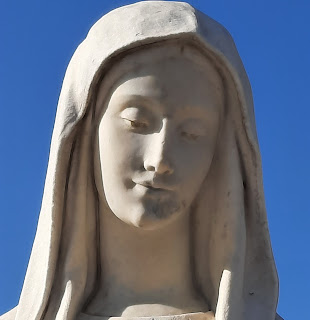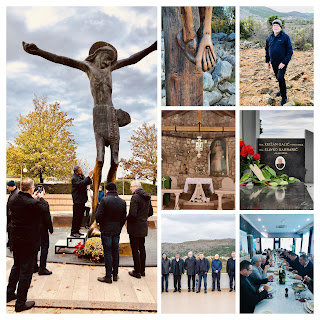“Abundance follows in His steps!” (Morning Prayer)
I was drying my right foot this first morning – November 23, 2021, feast of St. Columbanus – when time seemed to freeze and doubt arrived, clear as a bell. “What are you doing here?” it asked, “Why come all this way, when you already have everything you need at home?” It’s what happens early on in any pilgrimage. Questions arise, valid ones and those that come as temptations to discouragement. I dismissed the doubt as quickly as it came but there are questions about this place that remain unanswered and, perhaps they are unanswerable. In Medjugorje we are dealing with the transcendent. It is a place where the veil between heaven and earth is very thin. Heaven breaks into to earth here in a way that doesn’t happen too often in the world and it defies logic and reason.
I arrived here yesterday afternoon after three flights and a long car drive from Dubrovnik with Jure who speaks little English so there were smiles, nods and me talking too loud like you do in broken English when talking to a foreigner as if he were deaf. At the Polish Pilgrim House we are welcomed by the very kind Father Lukas and the hospitable Bozana and Maria both of whom mothered and fed us for the few days. I am a winter pilgrim, loving the sharpness of this time of year that help one focus on what really matters.
Our first Mass here the previous evening had the gospel of the poor widow. There’s a providence about the readings given for the day, a providence that speaks to the reality we are living in that moment. I have identified with this widow for many years; in a spiritual sense I am widow with little to offer but the little I have is what I give. It’s through years of living life in God that being widow, being poor in this sense, is a positive, blessed and happy experience. Even when I look at myself I see a rag, that I am a rag. And it’s in that lowly position that I come to my most profound experience of God and what is heavenly.
In Medjugorje you need to be spiritually poor or you need to be a child, childlike. A number of my friends have this beautiful childlike relationship with our Mother Mary and that is how they get the meaning of this place. My relationship with her is more reserved and certainly not childlike, so if anything is to happen to me here it will be through my being poor like the widow. It’s not easy for us to become widow at any level of life and, while we admire and speak beautifully about the simplicity of this woman, this state of life, few of us want to become who she is or what she represents.
We are here as a group of Pallottines – some the Provincials and Regionals of Europe with their Delegates who meet every two years in normal times. These meetings are usually discussions about our work but a number have not been able to come so this has been called a spiritual encounter. Most of the group are Polish, plus three from India who are based in Rome, including our Rector General and we are based in the newly opened Polish Pilgrim House, the first Pallottine foundation in Medjugorje. It rests at the foot of Mount Krecevac and isn’t far from the cemetery where Father Slavko Barbaric is buried, a man whom I met here twenty-five years ago and whom I greatly admire. He was down-to-earth and had a very grounded spirituality.
While we give a good deal of our time to the spiritual exercises of the place, the Polish Provincial who is responsible for establishing this house knows that relationships have to be established and much of our time is spent getting to know the Bishop of Mostar and the Franciscan Friars who are the dominant force in the Church in this part of the world. They have a community of fifteen in Medjugorje, many of them young and all of them very impressive. And all of them came to us for lunch on that first day.
I was sitting next to Fra Boris Barun a French Croatian Friar who is spiritual director to French speaking pilgrims. He speaks English so we had good conversations. I asked him about the visionaries, if he knew them, if they still live in Medjugorje and all that and he said that Maria who lives in Italy had come back for a few days for medical reasons. And he simply said, “I will ask her if you can be present at the apparition in her house on Thursday.” That took me by surprise and then he turned to talk to the person on his other side.
It’s difficult to put into words what happened to me in that moment. It was like I was alone at the table and something beautiful came into me, something in me was changed in an instant and I filled up to cry, not with sadness but with love and none of that word “love” comes near to expressing what was going on inside me. I thought I’d have to leave the table but didn’t. The experience was as strong as what stirred in me at the Divine Mercy Conference in 2010 – just as strong but different as well. But that too seemed like a divine visitation when Mercy itself entered into me.
The feeling remained and, as we climbed Apparition Hill in the afternoon, something in me knew that I would not be going to Maria’s house for the apparition because it had somehow already happened to me. There would be no need for me to go there. Not that I saw anything but it was a visitation, like I was touched by the apparition before it happened. I try not to exaggerate this and also do not want to deny it. And I’m not able to say it out loud in case it will overwhelm me. On Apparition Hill I remember that this day ten years ago I reached the highest point of the Camino, the Cruz de Fero, and a moment of pure joy. Peak moments!
I never got to the apparition! Maria didn’t want anyone there because she wanted to focus on the message but said I could go the previous day. Fra Boris tried to contact the Pallottines to tell me but we were all in Mostar with the Bishop. Not meant to be!
I learned in these few days in Medjugorje that where heaven meets earth like this, then time doesn’t matter so that what is to happen in two days’ time is already happening now. And added to this, place doesn’t matter either because heaven is not held bound by the limitations of our boundaries. People question how the Blessed Virgin can appear at the same time to one of the visionaries in one country and to another in another. She is from heaven and can be everywhere and anywhere whenever. She can be where and when God sends her. And she is the perfect emanation of God, a thought that came to me during Mass one of the evenings. The Book of Wisdom says, “she is pure emanation of the Almighty”, speaking of Wisdom itself. I sense it of Mary, arriving as a bright emanation of glory, right into the sanctuary to worship.
A little experience I had there about place. We were supposed to climb Mount Krecevac one morning but it was cancelled because of the weather forecast which turned out to be not as bad as predicted. So I chose to go off, away from the group to have some stillness, silence and solitude. “Alone with none but thee my God” was the Morning Prayer that accompanied me.
At Father Slavko’s grave I had seen a small church in the distance and decided to walk in its direction, feeling a bit guilty that I didn’t have the courage to climb the mountain alone. As I arrived at the little churchyard, resting among the dead, the dying leaves and the singing of birds, the word of Jesus to the Samaritan woman came clearly to me, “the time is coming when you will worship God neither on this mountain nor in Jerusalem but true worshippers will worship the Father in Spirit and in truth.” (John 4) The purpose of place, a holy place, is that it opens us more to prayer in spirit and truth, to divine visitations and this is the purpose of pilgrimage, so it is important, necessary to go when called by God so that this purpose is fulfilled.
These divine visitations can take place anywhere in anyone’s life, like sitting at table with twenty other people or on top of a mountain. The thing about the divine is that its arrival is totally unplanned by us, unexpected, utterly surprising and it effects a change, a transformation within us that we do nothing to achieve. It is gift and grace.
In Medjugorje this is achieved best at Mass and adoration by which we are transported to heaven in a way like no other and the great thing is that these liturgies are so humble, balanced, reverent, rooted in real life reaching up to God. There is no hype, no excess, and no ego. And the music is something utterly transcendent. It begins in some deep place, a wellspring of salvation, its timbre seeming sombre at first, then drawn and carried upwards by voice and instrument, anointed. It is a place like no other. Archbishop Hoser called Medjugorje, “the confessional of the world” and this is one of its unique and powerful gifts, the number of people whose lives are transformed by confession of sin when it encounters the Mercy of God.
Archbishop Hoser was a Polish Pallottine appointed by Pope Francis as a pastoral visitator to Medjugorje, a man greatly respected here and it would seem that the Polish Pallottines are building on the foundation laid by him. This too is providential. Hoser’s role was purely pastoral. He was not to judge whether the apparitions were real or not. There is a strong focus on the spiritual event that Medjugorje has become and the need to offer pastoral accompaniment to the millions of pilgrims. This is the focus of the Polish Pilgrim House.
A striking convergence is that in 1981 Our Lady appeared in Kibeho, Rwanda and in the same year the Medjugorje apparitions began. Both countries were to go on to experience horrific conflicts in the early 1990’s. Interesting too is that Kibeho is a Pallottine Parish.
On the final day we visited the Media Centre/Radio Medjugorje where Fr. Jacob was giving an interview. An inspiring aspect of many people whose work is connected to the shrine is the authenticity and dynamism of their faith. Earlier in the week when we met Matteo, a young photographer and I asked him if photography was his job, he replied, “it’s my vocation!” That’s what you find all over Medjugorje – a strong sense of faith and vocation.
The evening Mass in St. James Church was led by the Pallottines with Fr. Jacob as main celebrant and preacher. During his homily he expressed something I have been trying to say in relation to the environment, quoting Pope Benedict XVI, “when “human ecology” is respected within society, environmental ecology also benefits. The book of nature is one and indivisible: in a word, integral human development. Our duties towards the environment are linked to our duties towards the human person. It would be wrong to uphold one set of duties while trampling on the other. Herein lies a grave contradiction in our mentality and practice today: one which demeans the person, disrupts the environment and damages society.”
It was a pure delight to meet Father Michael Fitzgerald from Cloyne whom I have not seen for years. Here is one who has arrived at the childlike state to which I aspire, which is essential for entering the Kingdom of God. But what will it take to get me to such a state? Good question! But the message of Medjugorje is one of peace, of not being afraid and a gospel text that was repeated several times through the week, “stand erect, and hold your heads high, for your liberation is near at hand!” (Luke 21:28)
Peace of soul (mir duše, odmor duše) is the gift of Christ our Lord, a fruit of the Holy Spirit and the gift of Medjugorje with which I return home.

Eamonn Monson SAC


